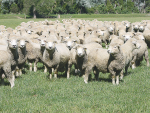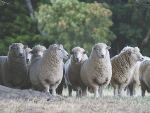A free text message service has been launched to alert farmers to changes in Facial Eczema (FE) spore counts within their region.
Beef + Lamb NZ (B+LNZ) recently launched the service which is designed to help farmers make informed and fast management decisions in response to changes in FE spore counts.
As well as providing the latest spore counts, the text service includes management tips and links to more information about the disease.
Additionally, farmers can send in questions and B+LNZ will ask experts for an answer.
Will Halliday, B+LNZ senior advisor biosecurity and animal welfare, says FE costs the country millions of dollars each year in lost production and has severe animal welfare implications.
“The faster farmers can respond to changes in spore counts, the better the outcomes will be in terms of production and animal welfare,” he says.
Management strategies to mitigate the impact of FE could include avoiding hard grazing, feeding “clean” forage crops such as chicory or plantain, dosing sheep and cattle with zinc oxide boluses or drenches, spraying zinc oxide onto grazed pastures or adding zinc oxide to cattle water troughs.
FE is caused by the spores of the fungus Pithomyces chartarum (which grows on litter at the base of pasture). The spores release a toxin which can damage the liver and bile ducts. In some cases, the bile ducts may become partially or completely blocked. The liver damage results in photosensitivity and sunburn which are the clinical signs of the disease.
The fungus is ubiquitous, but when temperature and moisture levels are high, the fungus grows rapidly, releasing huge numbers of toxic spores.
When spore counts are rising, Halliday says farmers need to keep a close eye on stock, looking out for signs of discomfort, photosensitivity and skin lesions.
“For every animal with clinical signs of FE – which are obvious skin lesions – there will be many more with sub-clinical disease, which is the invisible ongoing liver damage that can cause major productivity losses, especially at mating, lambing and calving,” he says.
The FE text is one of three text alert services offered by B+LNZ.
The others are ‘Pest Alerts’, a regional-specific pest and weeds information service (run in conjunction with AgResearch) and the ‘Lucerne Advice’ (run in conjunction with Lincoln University’s Dryland Pastures) which gives farmers timely lucerne management advice throughout the year.
All B+LNZ text services are free and farmers can opt out at any time.











